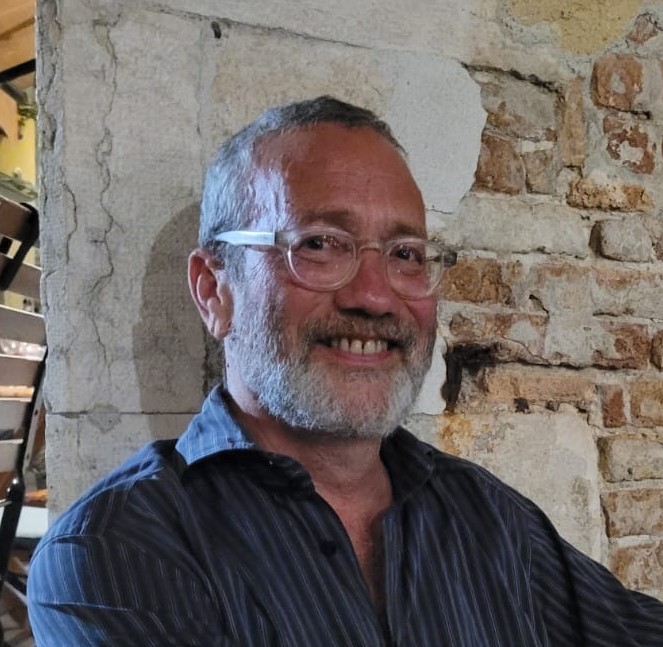
- Visiting Fellow
- Rutkin, Darrel H.
- Ph.D
- Time period: 01.10.23 - 15.07.24
- Research title: From Medieval to Renaissance Astrology: Marsilio Ficino’s Astrological Writings and Practices
- Research Region: Western Europe
- n. a.
- n. a.
- Video Statement

1987: B.A. Honors at The University of Texas, Austin (Classics, Philosophy).
1994: M.A. at Stanford University (Classics).
2000: Rome Prize, Lily Auchincloss Pre-Doctoral Fellowship in Post-Classical Humanistic— Modern Italian Studies, American Academy in Rome.
2002: Ph.D. at Indiana University, Bloomington (History of Science, History).
2005: Hanna Kiel Fellow, Villa I Tatti, The Harvard University Center for Italian Renaissance Studies.
2015-2017: Associate Lecturer in the History of Science, Unit for the History and Philosophy of Science, University of Sydney (Two-year fixed-term contract).
2018-2023: Assistant Professor (Researcher typo A [RTD-a], non-tenure track), Department of Philosophy and Cultural Heritage, Ca’ Foscari University of Venice.
H Darrel Rutkin is a historian of science and philosophy specializing in the history of medieval, Renaissance and early modern astrology, ca. 1250-1800. He is also very interested in the current state of astrological practice(s) in the West and around the world. His historical work focuses on astrology’s numerous relationships to science, theology and magic within their relevant conceptual, institutional, confessional, socio-political and cultural contexts over the longue durée. Among many other questions, he is concerned to establish astrology’s centrality to the premodern Aristotelian-Ptolemaic understanding of nature, ca. 1250-1600, both conceptually and institutionally. He then uses these structures—especially the patterns of their teaching at the finest premodern universities—to reveal the complex patterns of how astrology was marginalized and ultimately removed from the map of legitimate knowledge and practice during the Scientific Revolution and the Enlightenment, thereby becoming an esoteric discipline. He very deliberately approaches the history of astrology as an anthropologist would, by treating the historical actors as informants and providing thick descriptions of their theories and practices.
Monograph:
Sapientia Astrologica: Astrology, Magic and Natural Knowledge, ca. 1250-1800, in the series, “Archimedes: New Studies in the History and Philosophy of Science and Technology,” Jed Z. Buchwald (ed), Cham, SW: Springer, 3 vols.
Volume I, “Medieval Structures (1250-1500): Conceptual, Institutional, Socio-Political, Theologico-Religious and Cultural,” 2019.
Significant Reviews: Thony Christie, Renaissance Mathematicus, Sep. 18, 2019: https://thonyc.wordpress.com/2019/09/18/the-role-of-celestial-influence-in-the-complex-structure-of-medieval-knowledge/
Maria Sorokina, International Journal of Divination and Prognostication 2 (2021): 151-55.
Nicolas Weill-Parot, “Medieval Structures of Astrology,” Journal for the History of Astronomy 53 (2022): 372 – 76.
Volume II, “Renaissance Structures (1450-1500): Continuities and Transformations.” Anticipated completion date: May 2025.
Volume III, “Early Modern Structures (1500-1800): Continuities and Transformations.” Anticipated completion date: May 2029.
Journal Articles and Book Chapters:
“A Cosmological Controversy in the Renaissance: Marsilio Ficino’s and Giovanni Pico della Mirandola’s Contrasting Views on the Animation of the Heavens,” for a special issue of History of the Philosophy of Science (HOPOS), edited by Jonathan Regier and Charles Wolfe, HOPOS 11 (2021): 604-620.
“Dancing with the Stars: A Preliminary Exploration as to Whether the Astrology in Ficino’s De vita is Theurgical,” in Marsilio Ficino’s Cosmology: Sources and Reception, edited by H Darrel Rutkin and Denis J.-J. Robichaud, Bruniana & Campanelliana 26 (2020/2): 403-19.
“Optimus Malorum: Giovanni Pico della Mirandola’s Complex and Highly Interested Use of Ptolemy in the Disputationes adversus astrologiam divinatricem (1496), A Preliminary Survey,” in Ptolemy’s Science of the Stars in the Middle Ages, David Juste, Benno van Dalen, Dag Nikolaus Hasse and Charles Burnett, Turnhout: Brepols (Ptolemaeus Arabus et Latinus—Studies 1), 2020, 387-406.
“Is Astrology a Type of Divination?: Thomas Aquinas, the Index of Prohibited Books and the Construction of a Legitimate Astrology in the Middle Ages and the Renaissance,” International Journal of Divination and Prognostication 1 (2019): 36-74.
“How to Accurately Account for Astrology’s Marginalization in the History of Science and Culture: The Essential Importance of an Interpretive Framework,” in a special issue of Early Science and Medicine, edited by Hiro Hirai and Rienk Vermij, 23 (2018): 217-43.
“An Idealized Astrological Courtier at a 13th-Century Papal and Royal Court: The Case of Roger Bacon,” in De Frédéric II à Rodolphe II: Astrologie, divination et magie dans les cours (XIIIe-XVIIe siècle), Jean-Patrice Boudet, Martine Ostorero and Agostino Paravicini Bagliani (eds), Micrologus Library 85, 2017, 53-69.
“Teaching Astrology in the 16th Century: Giuliano Ristori and Filippo Fantoni on Pseudo-Prophets and Other Effects of Great Conjunctions,” in From Masha’allah to Kepler: Theory and Practice in Medieval and Renaissance Astrology, Charles Burnett and Dorian Gieseler Greenbaum (eds), Ceredigion, Wales: Sophia Centre Press, 2015, 353-406.
“Astrology, Politics and Power in 16th-century Florence: Giuliano Ristori’s Extensive Judgment on Cosimo I’s Nativity (1537),” in Astrologers and their Clients in Medieval and Early Modern Europe, Wiebke Deimann and David Juste (eds), Cologne: Böhlau Verlag, 2015, 139-150.